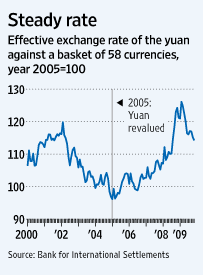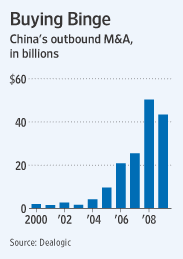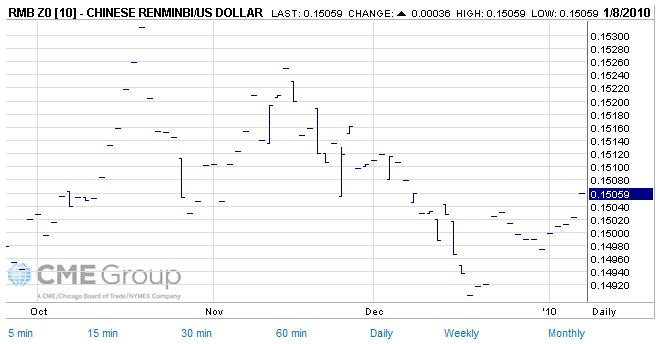January 8th 2010
Chinese RMB Set to Appreciate in 2010
The Chinese Yuan (RMB) spent all of 2009 pegged to the Dollar at 6.83. Since the Dollar depreciated against almost every other currency during that time period, the Yuan has fallen against these currencies, undoing most of its appreciation in 2008. As a result of both international pressure and internal economic conditions, however, the Yuan’s stasis should come to an end soon. The only questions are when, how and to what extent.

In hindsight, the Central Bank (i.e. state economic planners) of China were probably justified in holding the Yuan in 2008. At a time when forex markets (and other capital markets, for that matter) were behaving erratically, the Yuan was a baston of stability. China’s premier, Wen Jiabao, recently boasted, “Keeping the yuan’s value basically steady is our contribution to the international community at a time when the world’s major currencies have been devalued.” In fact, there is evidence that the Central Bank went against market forces in the opposite direction during the height of the credit crisis, and successfully prevented the Yuan from depreciating, thus proving that a currency peg can work both ways. The result was price stability, and a boost to exporters that had been damaged by the falloff in foreign demand for Chinese goods.
With the global economy emerging from recession, the argument for maintaining the peg is becoming less tenable. China’s economy, itself, grew at an impressive 8.5% in 2009, and is forecast to grow even faster in 2010, by 9.5%. Thanks to a surge in bank lending and the government’s massive economic stimulus program, inflation is also ticking up. It has been approximated at 2.5%, but is contradicted by spikes of 50%+ in the prices of certain staple goods, and certainly doesn’t take into account the rise in asset prices. China’s benchmark stock market index surged 90% in 2009, and property prices increased by 30% in some areas.
The dual concerns, of course, are that the money supply is expanding too fast and that bubbles are forming in certain asset markets. The weak RMB is certainly not helping either. Thanks to relaxed capital market controls and expectations of further appreciation, speculative “hot money” is once again pouring into China. Holding down the Yuan in the face of such pressure is becoming prohibitivel expensive: “China’s foreign-exchange reserves climbed 17 percent in the first nine months of 2009 to $2.27 trillion, the world’s largest holdings.” Some of the demand is naturally being tempered by bubble concerns, but the trend is still money coming into China.
There is also the argument, much mooted in economics circles, that an appreciation of the RMB would be good for the Chinese economy. Because of a perennially weak currency, its economy has become to addicted to exports to drive growth. “As a report from research firm Euromonitor International notes, in U.S. dollar terms, China’s consumer market lags those of the U.S., Japan and much of Europe, with private consumption just over one third of GDP in 2008.” This is probably a product of social and cultural forces, which still emphasize saving. Skeptics of the usefulnes of RMB appreciation point out that rebalancing the Chinese economy would start with changing the culture of saving, but a stronger currency would certainly provide a powerful incentive. Not to mention that a more valuable RMB would give Chinese companies more leverage in consummating outbound corporate M&A deals and natural resource acquisitions that they have been so keen on in recent years.

On the other side of the debate are skeptics of a different sort- those that think RMB appreciation is justified by forward-looking macroeconomic fundamentals. Some fear hyperinflation of the sort that China faced in 2007 and was only brought under control by the global economic recession and concomitant decline in resource prices. “Franklin Allen, a professor of finance at Wharton [University of Pennsylvania], estimates the likelihood of inflation reaching between 10% and 20% to be around one in five.” Any inflation beyond what is experienced in other economies would have to be reflected in the RMB. In a hyperinflation scenario, the Central Bank might even have to deliberately depreciate the currency.
Then there are the skeptics that forecast an economic crash in China. James Chanos, a wealthy hedge fund manager is leading this chorus, “warning that China’s hyperstimulated economy is headed for a crash, rather than the sustained boom that most economists predict. Its surging real estate sector, buoyed by a flood of speculative capital, looks like “Dubai times 1,000 — or worse.’ ”
While this view is gaining some traction, it is still relegated to the minority. Investors and economists are now operating under the firm assumption that China will allow the RMB to resume its appreciation soon. As for when, it could be any day, though probably not for a few months still. As for the questions of how and to what extent, some economists have argued for a one-off appreciation (10% has been suggested) in order to discourage future inflows of speculative capital. Most analysts, though, expect the rise to be gradual. Futures prices currently reflect a 3% rise over the next year, and the consensus among economists is similar. It also depends on how the Dollar performs over the near-term: “If better-than-expected growth in the U.S. helps the greenback recover this year…That would take some of the pressure off Chinese policy makers.”
Personally, I think expectations of a 3-4% rise over the next twelve months are pretty reasonable. The Chinese government doesn’t have much to gain (neither politically nor economically) from a rapid appreciation in the currency, so if/when the RMB rises, it will probably only be in “baby steps.”





January 10th, 2010 at 8:52 pm
I don’t think China will move it’s peg. They won’t cave to international pressure unless there is tangible consequences to not doing so. Also, they are forecasting a GDP growth of 10.2% in 2010. Even if they were cooking their books, I think that’s a sign that they are going to keep the yuan down.
February 9th, 2010 at 11:36 am
[…] month, I reported on how anticipation is (was) building towards a revaluation of the Chinese Yuan (RMB), confidently […]